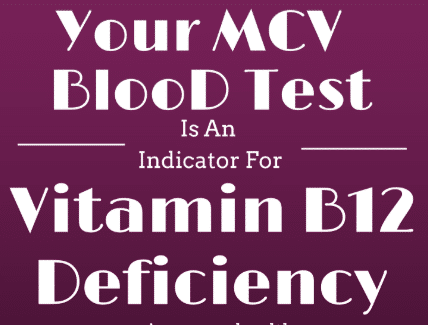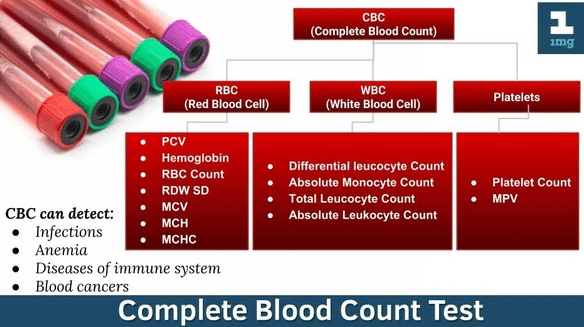MCV Blood Test: MCV stands for mean corpuscular volume. There are three main types of corpuscles (blood cells) in your blood–red blood cells, white blood cells, and platelets. An MCV blood test measures the average size of your red blood cells, also known as erythrocytes. Red blood cells move oxygen from your lungs to every cell in your body. Your cells need oxygen to grow, reproduce, and stay healthy.
If your red juice cells are too small or too large, it could be a harbinger of a blood disorder such as anemia, a vitamin failing, or other medical condition. An MCV blood test is regularly part of a complete blood count (CBC), a unremarkable screening test that measures many different peripherals of your blood, including red cells. It may likewise be used to diagnose or monitor certain blood complications.

What Is Mcv In Blood Test
MCH stands for “mean corpuscular hemoglobin.” An MCH value refers to the average quantity of hemoglobin present in a single red blood cell. Hemoglobin is the protein in your red blood cells that transports oxygen to the tissues of your body.
Your MCH value is disclosed to two other values, mean corpuscular volume (MCV) and represent corpuscular hemoglobin consolidation (MCHC). Together, MCH, MCV, and MCHC are frequently referred to as red blood cell indices.MCV is a measurement of the average size of your red juice cells. MCH results tend to mirror MCV results. This is because bigger red blood cells publicly contain more hemoglobin while poorer red blood cells tend to have less.
MCHC is a calculation of the amount of hemoglobin per unit volume in a single red blood cell. The difference between MCH and MCHC is that the MCHC measurement takes the volume or size of the red blood cell into account while MCH does not.
Mcv Blood Test High

Mean corpuscular volume (MCV), also known as mean cell volume, is an important number listed on a complete blood count (CBC) that can help diagnose different types of anemia as well as other health conditions. The MCV is a value that describes the average size of red blood cells (erythrocytes) in a blood sample.
A low MCV reveals small red blood cells and is called microcytosis, whereas a high MCV is called macrocytosis. While the MCV can contribute important information, it is not used alone—it is portrayed along with blood counts and other red blood cell indicators such as greedy corpuscular hemoglobin concentration (MCHC) and red cell distribution width (RDW) to narrow interpretations.
The MCV can be a helpful test even when the red blood cell count and other tests are normal, especially in the setting of kidney disease.
The mean corpuscular volume, or mean cell volume (MCV), is a measure of the average volume of a red blood corpuscle (or red blood cell). The measure is attained by multiplying a volume of blood by the proportion of blood that is cellular (the hematocrit), and dividing that product by the number of erythrocytes (red blood cells) in that volume. The mean corpuscular volume is a part of a standard complete blood count.
In patients with anemia, it is the MCV measurement that allows classification as either a microcytic anemia (MCV below normal range), normocytic anemia (MCV within normal range) or macrocytic anemia (MCV above normal range). Normocytic anemia is usually deemed so because the bone marrow has not yet responded with a change in cell volume. It occurs occasionally in acute conditions, namely blood loss and hemolysis.
If the MCV was determined by automated equipment, the result can be compared to RBC morphology on a peripheral blood smear, where a normal RBC is about the size of a normal lymphocyte nucleus. Any deviation would usually be indicative of either faulty equipment or technician error, although there are some conditions that present with high MCV without megaloblastic cells.
Blood Test Mcv
MCH levels refer to the average amount of hemoglobin found in the red blood cells in the body. Hemoglobin is a protein in the blood that allows red blood cells to deliver oxygen to the cells and tissues in the body.
Though they are very similar, MCH levels should not be confused with MCHC levels.
MCH levels are the average amount of hemoglobin that is in each red blood cell. MCHC levels are the average weight of that hemoglobin based on the volume of red blood cells. Both are a reflection of the health of the hemoglobin in the blood.
A complete blood count test, or simply CBC test, is designed to give doctors a general overview of a person’s health. The test can help screen people for a variety of issues at once and may help diagnose conditions, such as bleeding disorders, infections, and anemia.
Regular health screenings will often include a CBC test. If the results come back normal, the person may not need another test until their next health screening. Doctors may order CBC tests if a person shows signs of any disorder that can affect the blood.
A CBC test can also be used to help monitor individuals who have blood disorders. Doctors will use them to track the progress of a treatment and determine how effective it is.
CBC tests examine all three types of cells in the blood. The test will give a total white, red, and platelet cell count.
Doctors will often order a CBC test to find out a person’s MCH levels. Normal MCH levels are around 27 to 33 picograms (pg) per cell in adults. These numbers may vary based on the machine used to carry out the test.
The numbers are different in young children. A person with a low MCH has concentrations at or below 26 pg per cell. A person with high MCH levels will have concentrations at 34 pg per cell or more.
What is considered high MCV?
High MCV. A high MCV implies the red blood cells are larger than normal, or macrocytic. Causes of macrocytic anemia include:9 Vitamin B12 deficiency. Folate deficiency (both vitamin B12 deficiency and folate deficiencies are also called megaloblastic anemia, due to the macrocytic RBCs)
Does high MCV mean cancer?
BACKGROUND: An elevated mean corpuscular volume (MCV) is associated with aging, nutrition, alcohol abuse and more, and it is known as a survival predictor in chronically ill patients. Elevated MCV level was related to an increased risk of liver cancer mortality in men (aHR, 3.55; 95% CI, 1.75-7.21).


